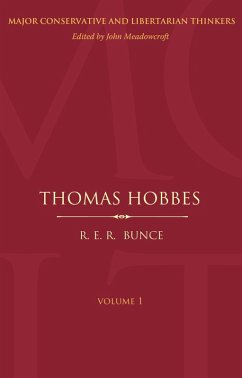In this volume, Dr Bunce (University of Cambridge) introduces Hobbes' ambitious philosophical project to discover the principles that govern the social world. If Hobbes' immodest assessment that he successfully attained this goal may be disputed, Bunce nevertheless captures the extraordinary enduring value of Hobbes' work for the contemporary reader. Thomas Hobbes's name and the title of his most famous work, Leviathan, have come to be synonymous with the idea that the natural state of humankind is 'nasty, brutish, and short' and only the intervention of a munificent overlord may spare men and women from this unenviable fate by imposing order where there would otherwise be chaos. The problem that Hobbes formulated resonates through the centuries as the enduring dilemma of political organisation and social cooperation. Indeed it can be seen today in fields as diverse as theoretical game theory and international relations.
Bitte wählen Sie Ihr Anliegen aus.
Rechnungen
Retourenschein anfordern
Bestellstatus
Storno


